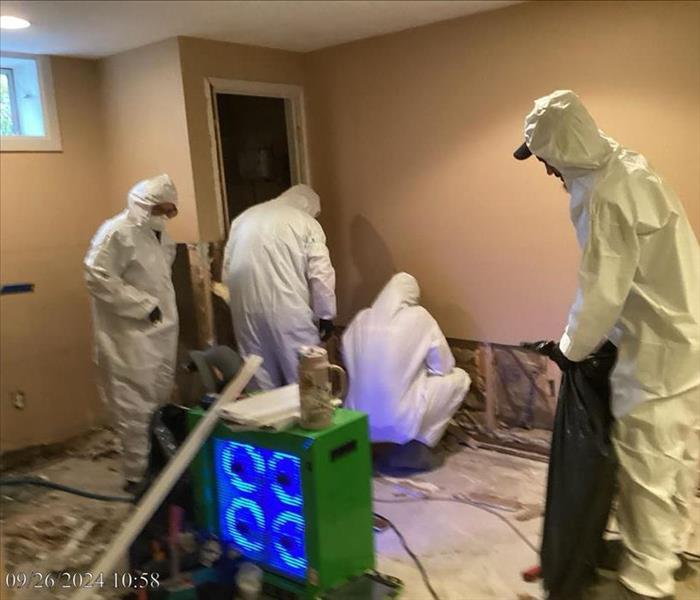How to Safely Store Flammable Chemicals and Materials: Expert Tips to Prevent Fires
12/18/2024 (Permalink)
 Discuss expert insights on how to safely store flammable chemicals and materials to minimize fire risks.
Discuss expert insights on how to safely store flammable chemicals and materials to minimize fire risks.
Proper storage of flammable chemicals and materials is essential for preventing fires in both residential and commercial settings. Whether you’re managing a small workshop or a large industrial facility, failing to store these items safely can lead to dangerous situations. At SERVPRO®, we understand the critical role fire prevention plays in protecting homes, businesses, and lives. In this blog, we’ll discuss expert insights on how to safely store flammable chemicals and materials to minimize fire risks.
The Importance of Safe Storage for Flammable Materials
Flammable chemicals and materials can ignite easily if exposed to heat, sparks, or open flames. Without proper storage, these substances pose a significant risk of fire. According to the National Fire Protection Association (NFPA), between 2014 and 2018, an average of 1,400 structure fires involving flammable or combustible liquids occurred annually in the U.S., causing millions in property damage. You can find more fire safety statistics from the NFPA here.
Key Guidelines for Safely Storing Flammable Chemicals and Materials
Storing flammable materials safely requires careful planning and adherence to safety protocols. Below are some expert tips to ensure that your flammable materials are stored in a manner that reduces the risk of fire.
1. Use Approved Containers
One of the most critical steps in safely storing flammable chemicals is ensuring they are kept in appropriate containers. Containers must be made of fire-resistant materials and specifically designed for the chemicals they hold. For example, metal containers are often used to store gasoline, while chemical-resistant plastic containers are suitable for certain solvents and acids.
- Label all containers clearly: Make sure all containers are properly labeled with the contents and hazard warnings to ensure safe handling and avoid mixing incompatible materials.
- Check for leaks: Regularly inspect containers for any signs of damage, rust, or leaks, which can increase fire risks.
2. Store in a Well-Ventilated Area
Flammable chemicals can release vapors that are hazardous and potentially combustible. To prevent vapor buildup, always store these materials in a well-ventilated area. Ensure that the storage space has proper airflow and is free of potential ignition sources, such as electrical outlets or open flames.
- Keep storage away from direct sunlight: Heat sources, including sunlight, can increase the temperature of flammable materials, causing them to ignite or release harmful vapors.
3. Use Flame-Resistant Storage Cabinets
For businesses or facilities that handle large quantities of flammable chemicals, investing in flame-resistant storage cabinets is essential. These cabinets are specially designed to contain flammable liquids and protect them from external heat sources.
- Store like chemicals together: Group flammable materials by type and ensure that incompatible substances (such as oxidizers and flammables) are stored separately to prevent dangerous chemical reactions.
- Lock storage cabinets: Keep storage cabinets locked to restrict access and reduce the chance of accidental spills or fires.
4. Maintain Proper Distances from Ignition Sources
Flammable chemicals should always be stored at a safe distance from any potential ignition sources, including electrical equipment, machinery, heaters, and open flames. Be mindful of local building codes and NFPA regulations, which often specify minimum distances between flammable material storage and ignition sources.
- Install fire extinguishers nearby: Place fire extinguishers near flammable material storage areas to ensure quick access in the event of a fire. Make sure that employees or household members know how to use fire extinguishers properly.
5. Store Flammable Waste Safely
Flammable waste, such as rags soaked in solvents or used chemicals, also presents a fire hazard. Improper disposal of this waste can lead to spontaneous combustion. To store flammable waste safely:
- Use metal waste bins with self-closing lids: These bins are designed to contain flammable waste and minimize the risk of combustion.
- Dispose of waste promptly: Do not allow flammable waste to accumulate. Arrange for regular disposal through a licensed waste management company.
6. Follow OSHA and NFPA Guidelines
Both the Occupational Safety and Health Administration (OSHA) and the NFPA provide detailed regulations and best practices for the safe handling and storage of flammable materials. Regularly review and implement these guidelines in your workplace or home to ensure compliance and enhance fire safety.
- Provide employee training: For businesses, ensure all employees are trained in the safe handling and storage of flammable materials. This includes understanding hazard labels, using appropriate personal protective equipment (PPE), and knowing emergency procedures.
Conclusion
Proper storage of flammable chemicals and materials is vital to reducing the risk of fires in both residential and commercial settings. By using approved containers, storing materials in well-ventilated areas, and following fire safety guidelines, you can protect your property from potential fire hazards. At SERVPRO, we are committed to helping homeowners and businesses safeguard their spaces with expert fire prevention advice and fire damage restoration services.
Take proactive steps to protect your property from fire risks by ensuring your flammable materials are stored safely and securely. For more fire safety tips or assistance with fire damage restoration, contact SERVPRO today!




 24/7 Emergency Service
24/7 Emergency Service